|
|
|
Sort Order |
|
|
|
Items / Page
|
|
|
|
|
|
|
| Srl | Item |
| 1 |
ID:
128719
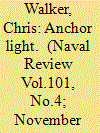

|
|
|
|
|
| Publication |
2013.
|
| Summary/Abstract |
Buster hated anchoring. In all his years in command of frigates no other ship's evolution had developed such capacity for cock - up. As he mounted the bridge ladder he expected the worst, and was rarely disappointed. An unconvincing report, the hint of a fumble on the focsle chippy's grubby cap at an unusually rakish angle - and the bridge steps would run red.
|
|
|
|
|
|
|
|
|
|
|
|
|
|
|
|
| 2 |
ID:
128738
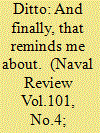

|
|
|
|
|
| Publication |
2013.
|
| Summary/Abstract |
Since I now live in the Gulf, it was a happy coincidence that found me in Portsmouth on 16th July 2013 and therefore able to attend the Centenary Party; and what a splendid affairs it was. I must have taken much work to prepare and I'm sure members will join me in thanking everyone involved.
|
|
|
|
|
|
|
|
|
|
|
|
|
|
|
|
| 3 |
ID:
130063
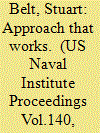

|
|
|
|
|
| Publication |
2014.
|
| Summary/Abstract |
When it comes to solving problems with China's overreach at sea, there are laws for that.
|
|
|
|
|
|
|
|
|
|
|
|
|
|
|
|
| 4 |
ID:
130868
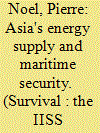

|
|
|
|
|
| Publication |
2014.
|
| Summary/Abstract |
Asia's reliance on international, seaborne energy trade is conducive to strategic cooperation. Whether this will outweigh strategic competition is far from certain. The Asia-Pacific accounts for a large and growing share of the world's energy-demand growth. With imports rising faster than consumption, the region is rapidly becoming the new centre of gravity for global energy markets. Such dynamics have made energy security a key policy concern for Asian states. The naval capacities of these countries are also growing swiftly, prompting some analysts to ask whether an arms race has begun. Although no one would suggest that this build-up of naval power is primarily driven by the need to secure energy supplies, the Chinese and Indian governments have identified energy and resource security as one rationale for developing naval power, particularly blue-water capabilities.
|
|
|
|
|
|
|
|
|
|
|
|
|
|
|
|
| 5 |
ID:
132185
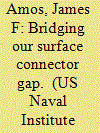

|
|
|
|
|
| Publication |
2014.
|
| Summary/Abstract |
In a new strategic environment, the Marines' ability to expeditiously get people and equipment ashore may be more important than ever. Emerging platforms and technologies promise to be game-changers.
|
|
|
|
|
|
|
|
|
|
|
|
|
|
|
|
| 6 |
ID:
131191
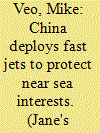

|
|
|
|
|
| Publication |
2014.
|
| Summary/Abstract |
Recent events in the South China and East China seas suggest an increase in the confidence and capabilities of the china's People's Liberation Army Air Force (PLAAF) and People's Liberation Army Navy Air Force (PLANAF).
|
|
|
|
|
|
|
|
|
|
|
|
|
|
|
|
| 7 |
ID:
091423
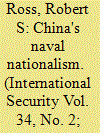

|
|
|
|
|
| Publication |
2009.
|
| Summary/Abstract |
Recent developments in Chinese politics and defense policy indicate that China will soon embark on an ambitious maritime policy that will include construction of a power-projection navy centered on an aircraft carrier. But just as nationalism and the pursuit of status encouraged past land powers to seek great power maritime capabilities, widespread nationalism, growing social instability, and the leadership's concern for its political legitimacy drive China's naval ambition. China's maritime power, however, will be limited by the constraints experienced by all land powers: enduring challenges to Chinese territorial security and a corresponding commitment to a large ground force capability will constrain China's naval capabilities and its potential challenge to U.S. maritime security. Nonetheless, China's naval nationalism will challenge U.S.-China cooperation. It will likely elicit increased U.S. naval spending and deployments, as well as politicization of China policy in the United States, challenging the United States to develop policy to manage U.S.-China naval competition to allow for continued political cooperation.
|
|
|
|
|
|
|
|
|
|
|
|
|
|
|
|
| 8 |
ID:
130755
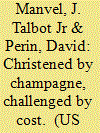

|
|
|
|
|
| Publication |
2014.
|
| Summary/Abstract |
Despite price-tag increases, the new Ford -class carriers won't be a boondoggle, but a boon-because ultimately, bigger = more bang for the buck.
On 9 November 2013 the nation's newest aircraft carrier, the Gerald R. Ford , was christened and blessed at a time-honored ceremony in which the hull is first wetted by the special liquid of a bottle-now champagne-to give her good luck before launching her into the water. The Ford has been built at great expense, now estimated to be $12.9 billion inclusive of design costs. Some are surprised at the price tag and argue that it is unaffordable, and that the U.S. Navy and the shipbuilder must dramatically reduce this dollar amount if we are to continue to buy and build these ships. Now that we have christened the Ford and can see her, it is a good time to review why we built her, why three administrations-two Democrat (Clinton/Obama) and one Republican (Bush-43)-as well as seven Congresses (106th-112th) have initially approved not only the Gerald R. Ford (CVN-78), but also the John F. Kennedy (CVN-79), and the Enterprise (CVN-80).
|
|
|
|
|
|
|
|
|
|
|
|
|
|
|
|
| 9 |
ID:
082454


|
|
|
|
|
| Publication |
2008.
|
| Summary/Abstract |
The British historian and maritime strategist, Julian Stafford Corbett,
published
The Campaign of Trafalgar
in 1910. The book presents a complex
account of the political, diplomatic and military campaign that resulted in
defeat for the combined French-Spanish fleet and the death of Nelson.
Corbett made a compelling, and at the time quite controversial, argument
that Nelson's real genius was not the tactical mastery that was displayed on
21 October 1805 but his understanding of the strategic context of his
command and why this was the key lesson for his contemporary professional
audience.
|
|
|
|
|
|
|
|
|
|
|
|
|
|
|
|
| 10 |
ID:
133068
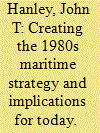

|
|
|
|
|
| Publication |
2014.
|
| Summary/Abstract |
While important differences exist, the first decade of the twenty-first century paralleled the 1970s for the Department of Defense and the U.S. Navy. U.S. armed forces were embroiled in extended and expensive counterinsurgency wars. American military equipment was growing old, budgets were tight, and extended projections called for significant decreases in the nation's armed forces, just as the main prospective military adversary was both rapidly modernizing and expanding its forces, particularly its navy. "From 1962 to 1972, the navy had programmed the construction of 42 ships per year, but between 1968 and 1975 only 12 ships, or less than a third as many per year, were programmed. In 1975, given the age of ships already at sea, and the navy-expected service life for a warship of 25-30 years, the service anticipated retiring about 4 percent of the active fleet each year."1 The Soviets were extending their defensive perimeter from two to three thousand kilometers.2 Today, the Chinese suggest extending their defensive perimeter from the "first island chain," enclosing the East and South China Seas, to the second, bounded by the Marianas, three thousand kilometers from the Chinese coast.3 In the 1970s, the United States questioned its own ability to fight forward, defend allies, and achieve objectives -as many defense analysts and many in the Navy do now.
|
|
|
|
|
|
|
|
|
|
|
|
|
|
|
|
| 11 |
ID:
133071


|
|
|
|
|
| Publication |
2014.
|
| Summary/Abstract |
It has been well over a decade since the first “prophets” of information warfare proclaimed a new age of conflict fought not just on air, sea, and land but with electrons in what came to be known as “cyberspace.”1 Since these early predictions, many incidents have confirmed that criminals, random hackers, and government-sanctioned specialists can wreak havoc on governments, military communications systems, and corporations. The Stuxnet worm alone helped delay-by months, perhaps years-the long-standing efforts of Iran to acquire sufficient nuclear material to build nuclear weapons.2 Recent revelations of hacking campaigns against such publications as the Wall Street Journal and New York Times have broadened concerns to include even the integrity of American democratic institutions.3 Meanwhile, the commander of U.S. Cyber Command has characterized cyber attacks designed to gain access to the intellectual property of American corporations as the “greatest transfer of wealth in human history.”
|
|
|
|
|
|
|
|
|
|
|
|
|
|
|
|
| 12 |
ID:
131969
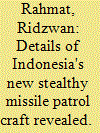

|
|
|
|
|
| Publication |
2014.
|
| Summary/Abstract |
The Indonesia Navy's (TIN-ALs) new 63 k Klewang class missile patrol craft will feature radar with wider coverage, missile with longer range, and a hull made from a new composite material.
|
|
|
|
|
|
|
|
|
|
|
|
|
|
|
|
| 13 |
ID:
131970
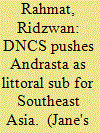

|
|
|
|
|
| Publication |
2014.
|
| Summary/Abstract |
French naval shipbuilding and systems groups DCNS is positioning its Andrasta compact submarine concept as a littoral patrol asset for Southeast Asian navies.
|
|
|
|
|
|
|
|
|
|
|
|
|
|
|
|
| 14 |
ID:
071601
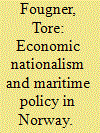

|
|
|
|
|
| Publication |
2006.
|
| Summary/Abstract |
While celebrating recent efforts to redefine 'economic nationalism' by placing nationalism and national identity - rather than the state or illiberal economic policies - at its core, this article takes issue with the tendency to provide an unnecessarily narrow specification of a new research agenda on economic nationalism. More specifically, it argues that the agenda should concern not merely how national identities and nationalism influence economic policies and processes, but also how the latter can influence the former. An argument is also made for this twoway relationship to be conceived in constitutive terms, and a study of the efforts to develop a maritime policy in Norway in the mid-1990s is presented to show the usefulness of this reformulated research agenda on economic nationalism.
|
|
|
|
|
|
|
|
|
|
|
|
|
|
|
|
| 15 |
ID:
108772


|
|
|
|
|
| Publication |
2011.
|
| Summary/Abstract |
This article comprehensively discusses the maritime dimension of the European Union's (EU's) security, which encompasses military and civilian aspects, intergovernmental and community components as well as institutional and geopolitical elements. First, the article provides a narrative of the development of the maritime element in the EU's security policy since the adoption of the European Security Strategy in 2003. By depicting the interrelations between the sea and the EU's security, the article shows that the maritime dimension of EU security is generally well established, but often obscured by the complicated institutional structure of the Union. Thereafter, the article emphasises the need to define an effective EU Maritime Security Strategy, which would provide a strategic framework for the Union's security-related activities regarding the sea that encompass maritime power projection, as well as maritime security and safety. Accordingly the article provides some recommendations concerning the definition of such a strategy and for appropriate constituting elements: the maritime-related risks and threats, the maritime strategic objectives, the means to implement the strategy, and the theatres of EU maritime operations.
|
|
|
|
|
|
|
|
|
|
|
|
|
|
|
|
| 16 |
ID:
128695
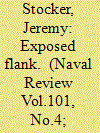

|
|
|
|
|
| Publication |
2013.
|
| Summary/Abstract |
A through survey of the current state of play with respect to maritime security, which poses some challenges questions for both the government and royal navy.
The strategic need for security at sea… would be judged by an informed electorate to be a matter of obligation for a maritime nations.
|
|
|
|
|
|
|
|
|
|
|
|
|
|
|
|
| 17 |
ID:
132990
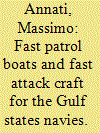

|
|
|
|
|
| Publication |
2014.
|
| Summary/Abstract |
The main tactical advantages of modern fast patrol boats (FPBs) and fast attack craft (FACs) are their versatility, high speed and excellent maneuverability, great striking power, small silhouette, and high degree of immunity to sea mines. Over decades, they have been the platforms of choice for a great number of mainly coastal states. Today the world wide demand especially for new FAC designs is growing exponentially.
|
|
|
|
|
|
|
|
|
|
|
|
|
|
|
|
| 18 |
ID:
131328
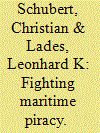

|
|
|
|
|
| Publication |
2014.
|
| Summary/Abstract |
Piracy in international waters is on the rise again, in particular off the coast of Somalia. While the dynamic game between pirates, ship-owners, insurance firms and the military seems to have reached some kind of equilibrium, piracy risks generating significant negative externalities to third parties (e.g. in terms of environmental hazards and terrorism), justifying attempts to contain it. We argue that these attempts may benefit from a look back - through the analytical lens of rational choice theory - to the most successful counterpiracy campaign ever undertaken, namely, the one led by the Roman general Gnaeus Pompeius Magnus (Pompey the Great) in 67 BC.
|
|
|
|
|
|
|
|
|
|
|
|
|
|
|
|
| 19 |
ID:
130060
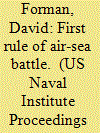

|
|
|
|
|
| Publication |
2014.
|
| Summary/Abstract |
When it comes to the much-discussed concept, misconceptions abound; the first thing to fix may be the nomenclature itself.
If there were a first rule of Air-Sea Battle (ASB), it should be: "Do not talk about Air-Sea Battle." The cloud of confusion and criticism surrounding the concept is undermining this Department of Defense 21st-century warfare initiative. When the world's only superpower announces something called "Air-Sea Battle ," the rest of the world listens, and the DOD must get it right. Failure to correct current misunderstandings about the idea could lead to unintended and unwanted consequences counter to U.S. strategic interests. It is time for Air-Sea Battle 2.0, and step one is changing the name.
|
|
|
|
|
|
|
|
|
|
|
|
|
|
|
|
| 20 |
ID:
133399
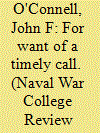

|
|
|
|
|
| Publication |
2013.
|
| Summary/Abstract |
This essay describes an incident of some thirty years ago that involved relations between the United States and Japan. It stemmed from a chance encounter at sea in international waters, between a U.S. warship and a Japanese commercial vessel. If there are lessons to be learned from this event, it is that small things matter; they are like grains of sand that gum up the machinery of smooth international relations. At the time, I was defense and naval attaché to the American embassy at Tokyo, where I became involved in the situation after the fact. To my knowledge, this is how the story unfolded.
|
|
|
|
|
|
|
|
|
|
|
|
|
|
|
|
|
|
|
|
|